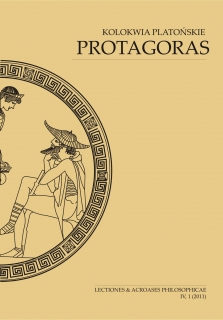Czy można świadomie czynić zło? Intelektualizm etyczny w Protagorasie Platona
Słowa kluczowe:
Platon, Protagoras, zło, etykaAbstrakt
<p><strong>Can The Evil Be Done Consciously? Ethical Intellectualism In Plato's Protagoras<br /></strong></p><p> </p><p>The most obvious paradox of Plato's dialogue Protagoras is statement that no one does not consciously make evil. The statement is connected with the rejection of two phenomena: an acrasia and the free will. It seems that Plato has made a considerable correction of the intellectualistic position in the Republic, but he repeats this paradox also in the late dialogue Timaeus. So it should be asked: what is the sense of the ethical intellectualism in the Protagoras? Does the ethical intellectualism deny the self-evident facts concerning human behavior? Did Plato really change his view? Is Aristotle's criticism of the ethical intellectualism accurate? The answers can be found in this paper.</p>Opublikowane
30-06-2011
Numer
Dział
Artykuły [1043]

